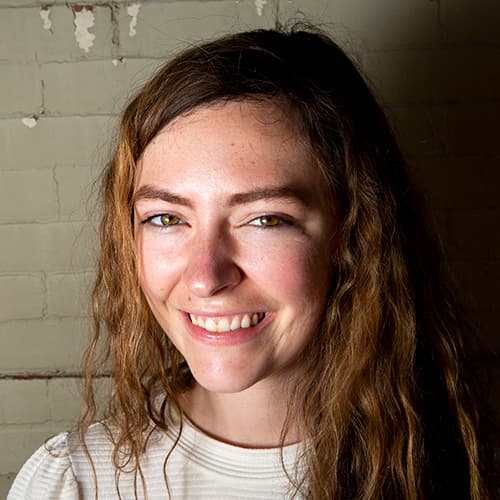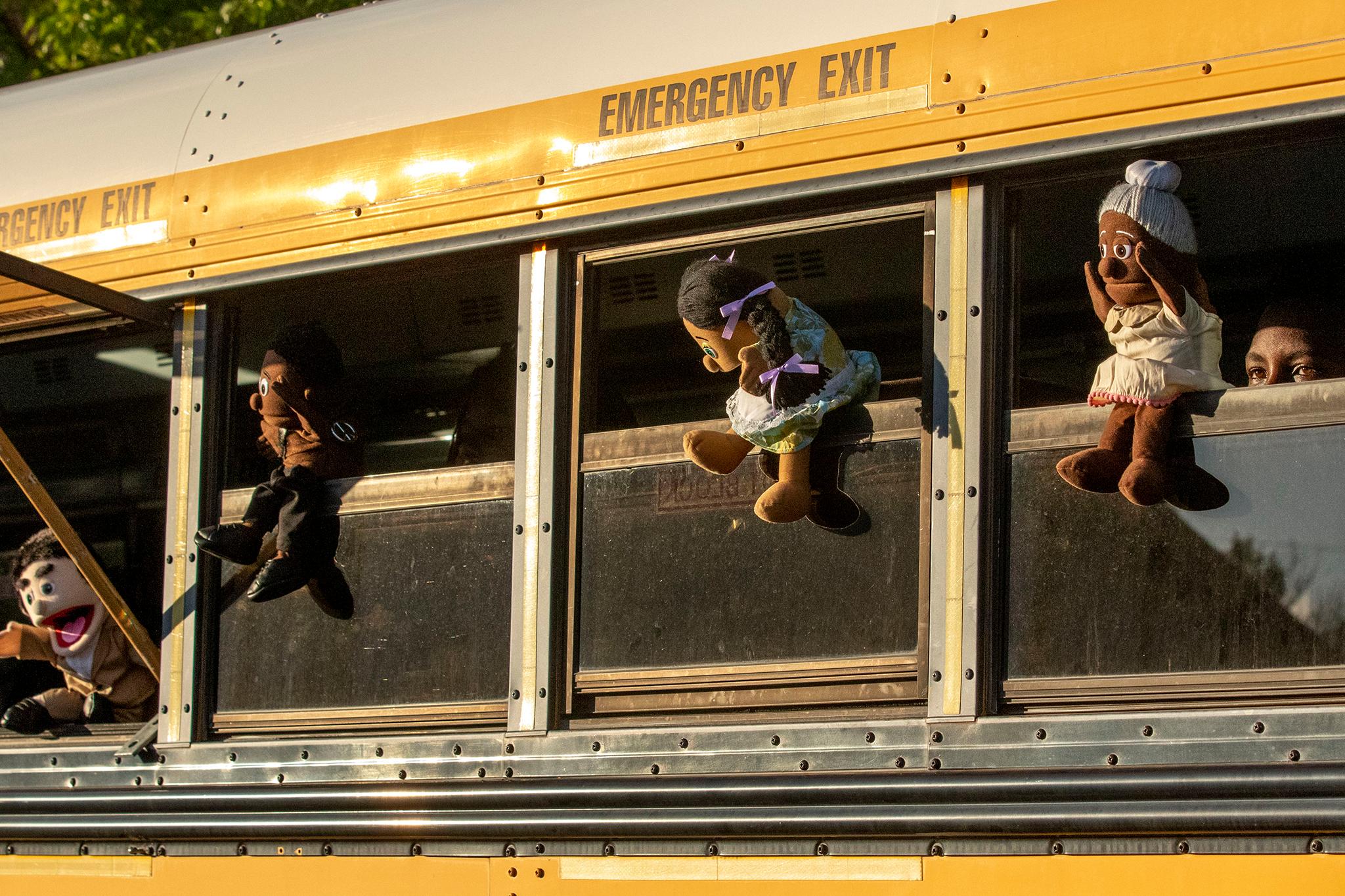Before the pandemic, Patrick Mueller and his Control Group Productions team bought a bus.
The theatre troupe, known for its immersive, experimental productions, had a vision for a site-specific mobile production that would take audience members on a tour through Denver as imagined in an apocalypse.
"But that happened in real life," Mueller, the group's artistic director, said. He said the bus became an asset or an albatross -- they weren't sure which. For months during the pandemic, the big yellow school bus sat unused.
Then, Mueller met Lisa Young, a local actor, director and educator.
When the pandemic hit, followed by the racial justice movement of 2020, Young started thinking about the impact of the stories we tell.
"I had noticed some of the inequities that surround theater. For women, for folks of color. For Black people in particular. For people living with disabilities, veterans, other folk who live a marginalized existence in society," Young said. "And so I started the process of dreaming. And I dreamt about what theater would look like, and be safe."
At the same time as parallel movements and groups in Colorado and nationwide were reevaluating how theatre gets made, Young launched a grassroots organization called IDEA Stages to help create safe spaces in theatre.
"It was all about community. It was all about accountability, and taking care of one another," she said. She founded IDEAs under a set of pillars: Inclusion, Diversity, Equity, Access and Stage.
IDEAs hosted a town hall, and Mueller saw a match for Control Group, whose focus he says is theatrical innovation in every sense of the word.
"Just as much as we need to take theater out of traditional venues and out of the picture frame into interactive experiences, we need to be telling different stories as well as telling them in different ways," Mueller said.
Mueller reached out to Young, asking how Control Group might help IDEAs serve their mission.
"One of our early recognitions is that prefabricating programming to quote-unquote 'serve a community' is very backwards," Mueller said. "It was often a dysfunction of time and resources of human energy, that we never felt like we had time to sit and have the community dialogues to understand the breadth of need."
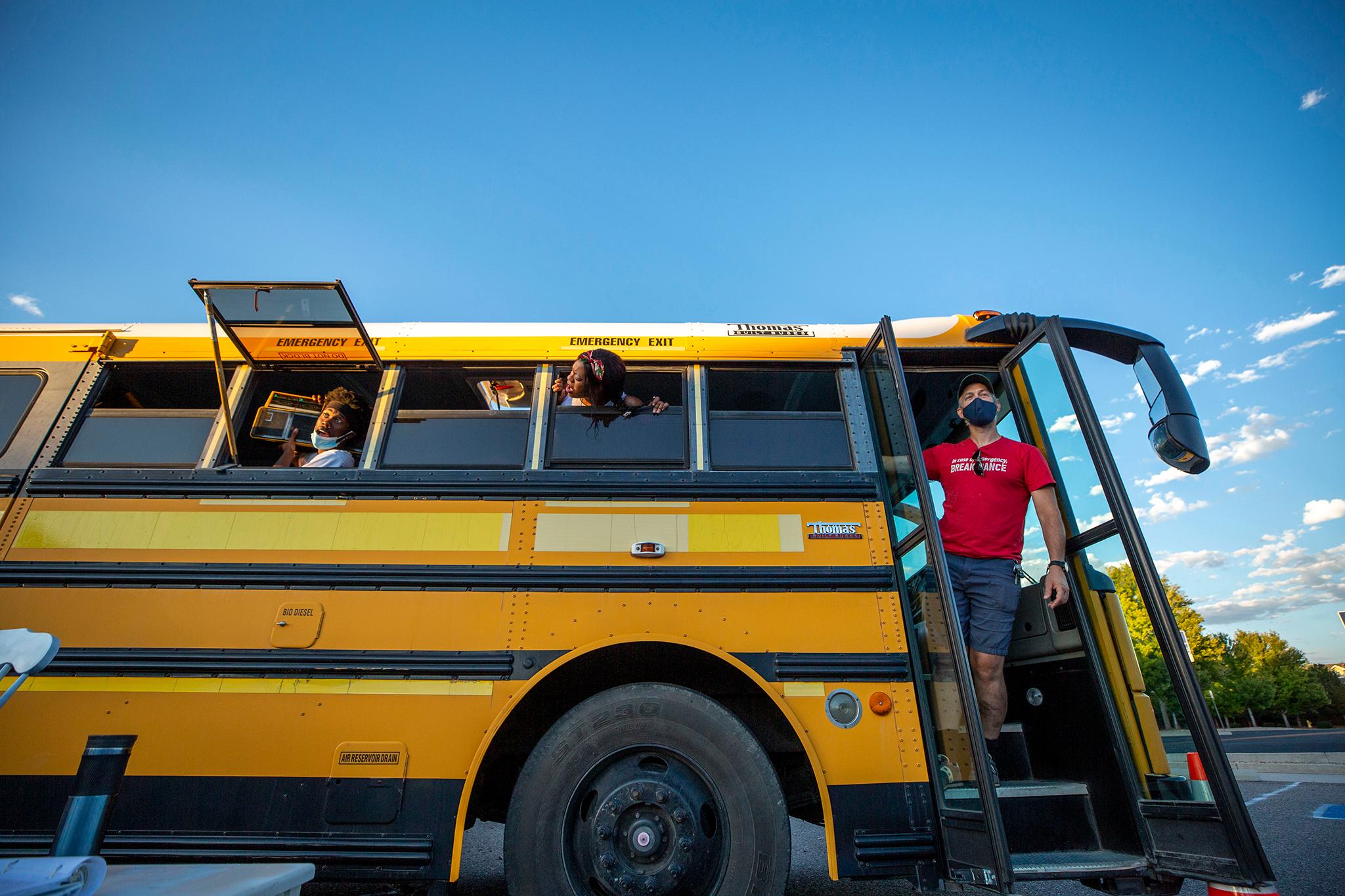
During that call, Mueller offered up Control Group's resources to help meet IDEAs' needs. At the very end of the list, he mentioned that they happened to have a school bus.
"And Lisa immediately lit up, like, 'Let me tell you about busing.'"
Now, the bus is stationed in the parking lot of Rising Star Missionary Baptist Church in Aurora for the production of "Sojourners Project: Busing," a pop-up, immersive show about Denver's busing history.
The production, which was created by IDEA Stages and co-produced by Control Group Productions, will play out on a temporary stage built in front of the school bus. Guests are invited to bring their own seats or pay a bit more to sit on recycled bus seats in the audience.
Young, one of the show's writers, says she often hears members of the theatre community say they have a hard time getting Black and brown folks to come to the theatre.
"That goes back to that whole thing that, well, they don't feel safe in your theater," she said. The bus enables the "Sojourners" team to bring theatre to the community, rather than trying to bring people to the theatre.
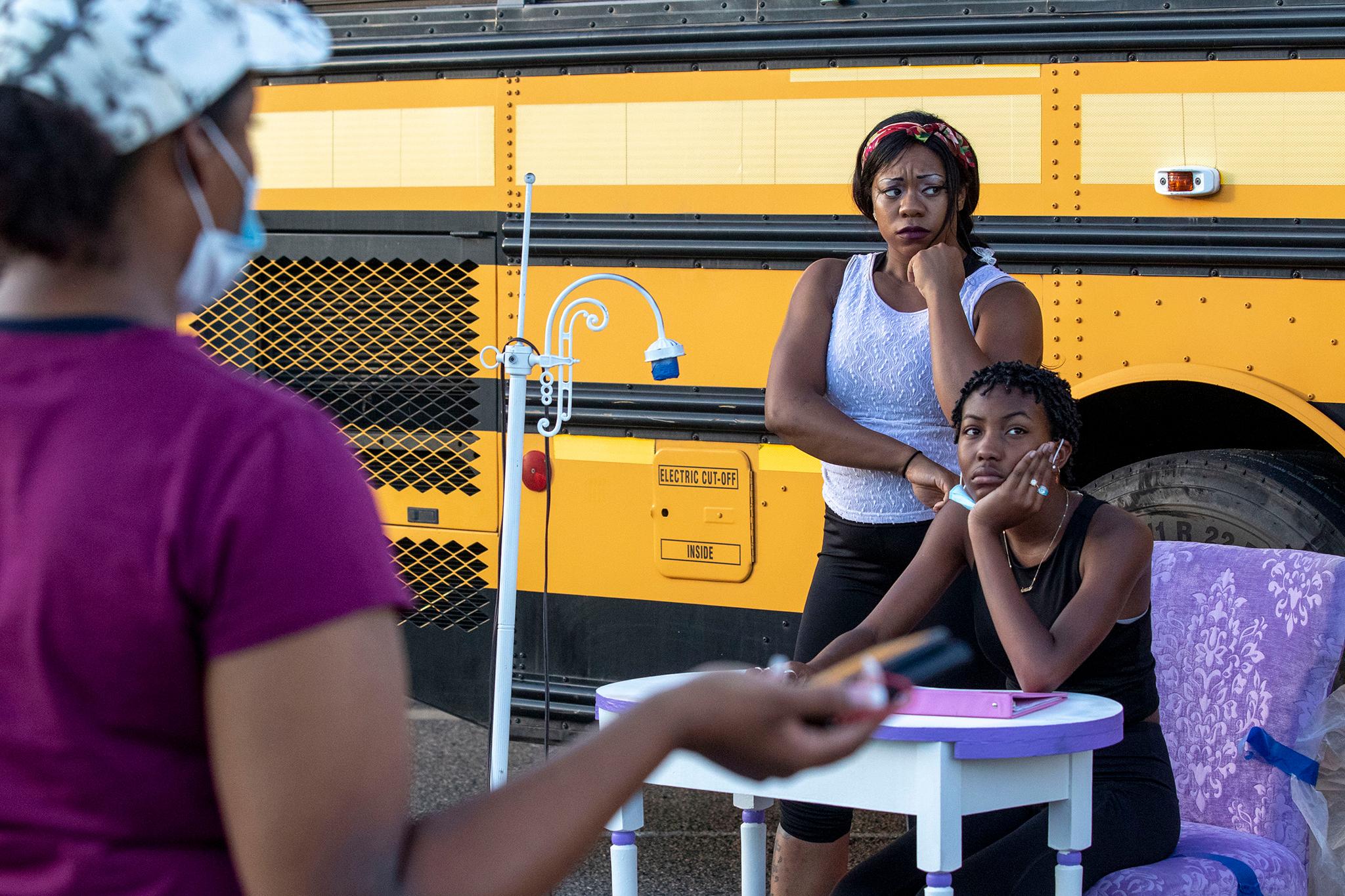
Originally, the plan was an immersive, mobile production where audience members actually sit in the bus. The team has had to change a few times according to the latest COVID-19 guidance. For now, the bus is stationary, and provides a backdrop for the production. The church provides space, as well as access to bathrooms and electricity.
Using narrative storytelling, musical performance and puppetry, the play explores Denver's decades long history of busing -- the good and the bad -- starting with DPS's 1968 resolution to desegregate schools by busing mostly Black and brown students to higher performing schools. The play introduces Rachel B. Noel, the first Black woman elected to public office in Colorado; explores the impact of the 1970 bus bombing that destroyed almost a third of the DPS bus fleet; and discusses busing in the larger context of the movement of Black and brown folks across Denver over three decades. And it shows how busing fits into the larger education system, and suggests that educational inequities have spanned decades, though they might take on different forms.
The show follows the Mason family, who have experienced multiple generations of systemic issues, from segregation to busing, and now the educational disparities being brought to light by at-home schooling and hybrid virtual education. It explores questions like what happens to the qualified Black teachers during forced integration, who busing was really meant to serve, how busing hollowed out public schools and put strain on the students, who often had to wake up early in the morning to be bused across town and missed sleep and extracurriculars. The puppets, meanwhile, act as supporting characters and also share facts about Colorado history from the windows of the bus.
The Masons are also the caretakers of a magical sentient bus called Chombo Basi Mashua, which means "vessel-bus-boat" in Swahili. Chombo is a vessel for the memories, culture, knowledge and emotions of the people who once travelled on the bus. Similarly, the show itself was written as a sort of vessel for the true stories of people who've lived through busing in Denver.
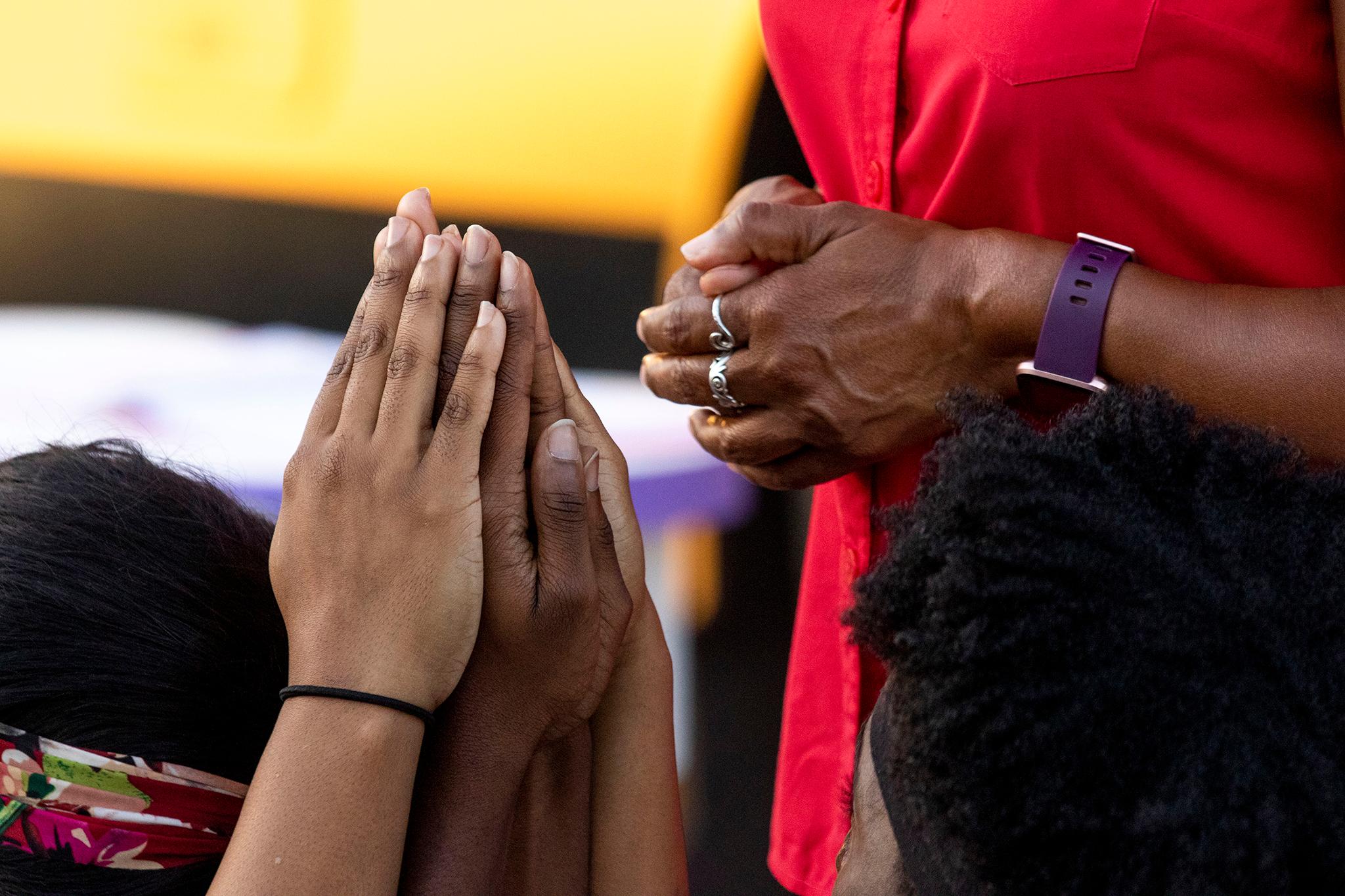
The "Sojourners" team read dozens of articles and reached out to community members who have felt the impact of disparities in Denver's education system. They conducted interviews and surveys to hear first-hand experiences with busing.
"There were people who were like, I would love to fill this out, but I'd rather talk to you because even typing this out is kind of traumatic for me," Young said.
The stories in the show are based on the stories that emerged in their conversations with Denver community members.
"They're told through fiction, but they come from nonfiction. They come from real life stories," Young said. "It feels like that was so long ago. And busing did not stop until 1995. We're not really that far removed from it."
The play is led by an all-Black woman creative team and has an all-Black cast, as well as predominantly Black design and technical teams.
Part of the idea behind "Sojourners" was to give people the resources to tell their own stories, when often they might face roadblocks like funding, or access to venue space.
"I'm pretty sure there are thousands and maybe even millions of Lisa Youngs out there who would make amazing work, but do we give them access and agency?" Young says part of the problem is an educational pipeline.
"If you look at who matriculates through arts programming or arts education, it's not folks who look like me, or folks with disabilities or all of the things -- I call them the isms and the phobias of theater," she said. "We have elitism, ableism, racism, sexism. All of those folks who are marginalized by those isms and phobias, they don't necessarily have the resources, connections, networks to do this. "
Because of that, she says, their stories don't get told, or they don't have agency over their stories.
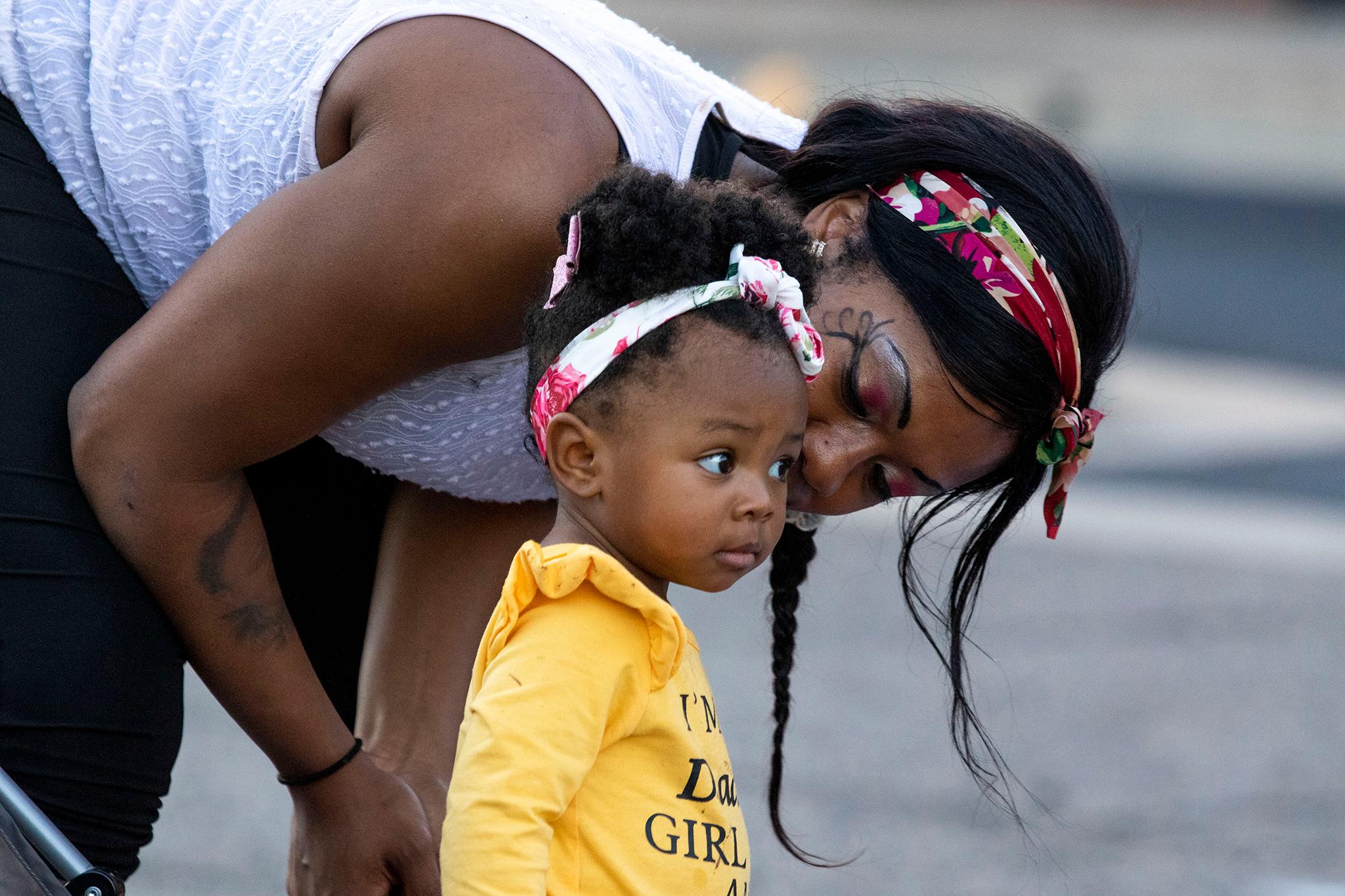
Young says it was important for her to create a safe environment using IDEAs' pillars, to give cast and crew members agency over the stories they were telling.
"We come into this space collaboratively. And we look at the words and we listen to one another," Young said. "I was very adamant that this would be different. We were going to dismantle some of those things that we've all experienced in theater."
"Busing" is the first production to come out of Sojourners Project, which Young and Mueller hope will produce a series of works created by Black and brown artists about the movement of Black and brown bodies.
"To sojourn is to live somewhere in a temporary state," Young said -- a place that is not one's own. "And then we talk about the mission of telling the stories of Black and brown folks who are moved throughout this world, with or without their consent."
Young says that future Sojourners productions would explore other ways that can happen.
"It could mean the transatlantic slave trade," she said. "It could mean the great migration. It could mean the Underground Railroad. It could be a queer brown child's story of couch surfing right now because their family does not accept them. "
The group hopes to eventually make the busing project mobile as originally planned, and to bring the production to schools, or wherever a school bus can park -- "Plug and play," Young calls it. When and how that can happen, of course, depends on the COVID-19 situation.
"We'll see what the world does. My magic eight ball keeps giving me the question marks," Mueller said.

Mueller and Young say the show shows the cyclical nature of flawed education systems.
Young says that through the Mason family's story, audience members learn about systemic racism's impact on multiple generations, starting with pre-integration and the inequity of resources in Denver's schools.
"You didn't have the same books," Young said. "You didn't have the same money funneled into the schools."
Busing was mandated as a potential remedy for some of those inequities, and while Young and Mueller said busing did have some positive effects, they learned from the stories collected from community members that it caused harm, too.
Mueller said that even the way busing was structured was in some ways designed to keep it from working.
"Denver actually played an outsized, unfortunate role in the fight against this policy," Mueller said. "That 6:30 am pickup was because bus routes were planned to be actively deterring students from using them, trying to send kids to open enroll back to their neighborhood school. We talked to with one mother at the time who decided to homeschool her children because instead of going to the school literally one block away, they were going to be bused all the way across town, an hour each direction."
Young says there's a new generational manifestation of the same underlying systemic problems -- that in the COVID-19 era of at-home schooling, Denver's education system is again showing its inequalities.
"You have kids who were sent home with a computer and told to get online, but they have no Wi-Fi access," Young said. "Or you have several generations, or groups of families or students living in the same household trying to do school. We as teachers say, 'Find a quiet place.' And for some families, that's not possible."
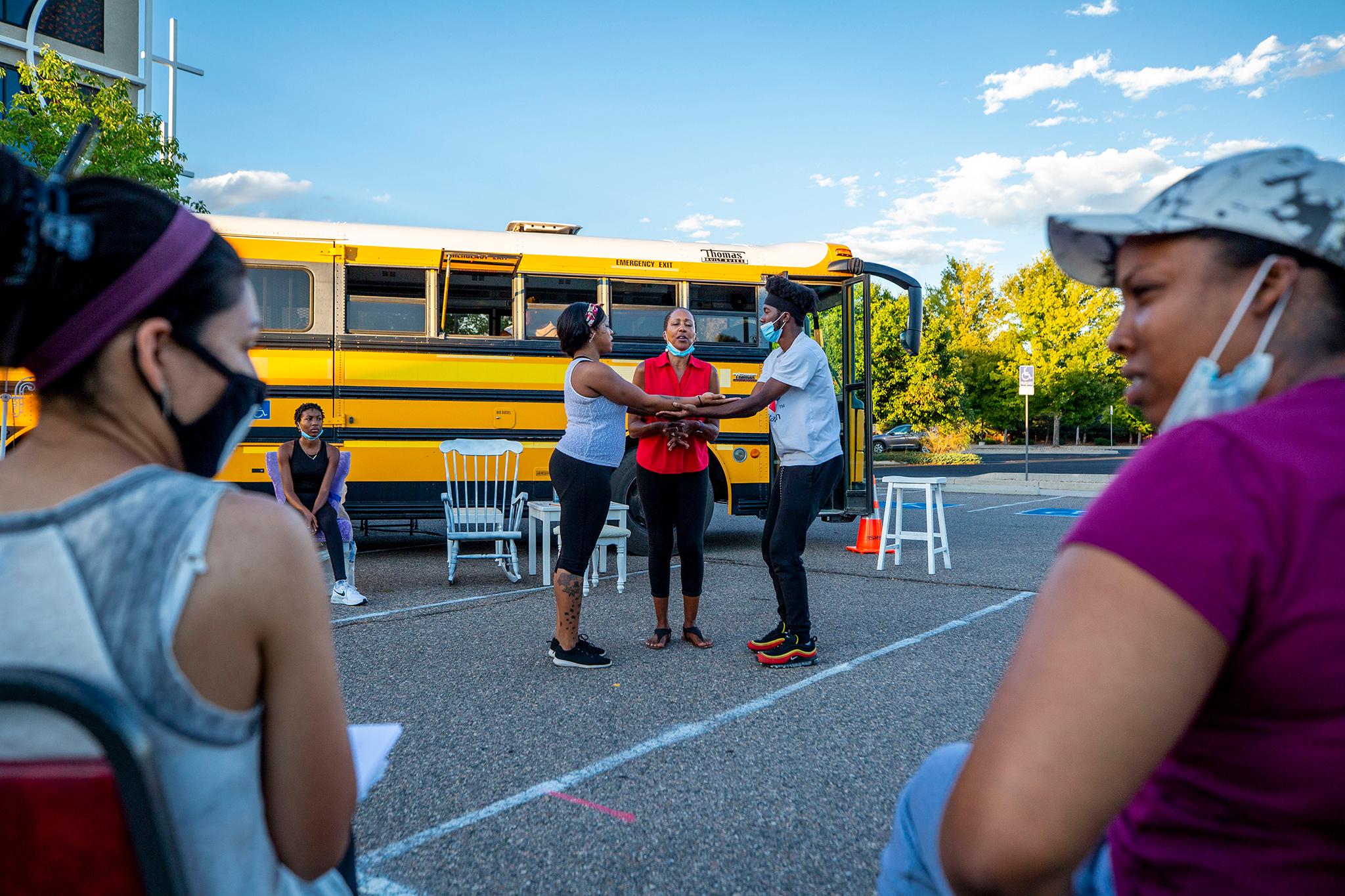
"Busing" also features an interactive gallery with links to resources for further learning, including historical research and interviews. They plan to bring educators to the show in hopes that they'll pass on the lessons themselves.
"That gets exciting, because it reaches not only the kids who're there now, but the next 20 years of students going through these schools, reaching a predominantly white faculty and predominantly Black schools," Mueller said.
Young hopes Sojourners will be a springboard for similar projects.
"Not just in Denver, Colorado, everywhere where theatre companies might have the resources and the ability to hand some things over without fear," Young said.
"Sojourners Project: Busing" runs September 8-26, 2021 outside Rising Star Missionary Baptist Church at 1500 South Dayton Street in Aurora. Bring your own seat tickets are $28 for General Admission or $18 for Students, Seniors, Artists or patrons In Need. VIP tickets are $40 and include an outdoor seat on a vintage bus bench.
